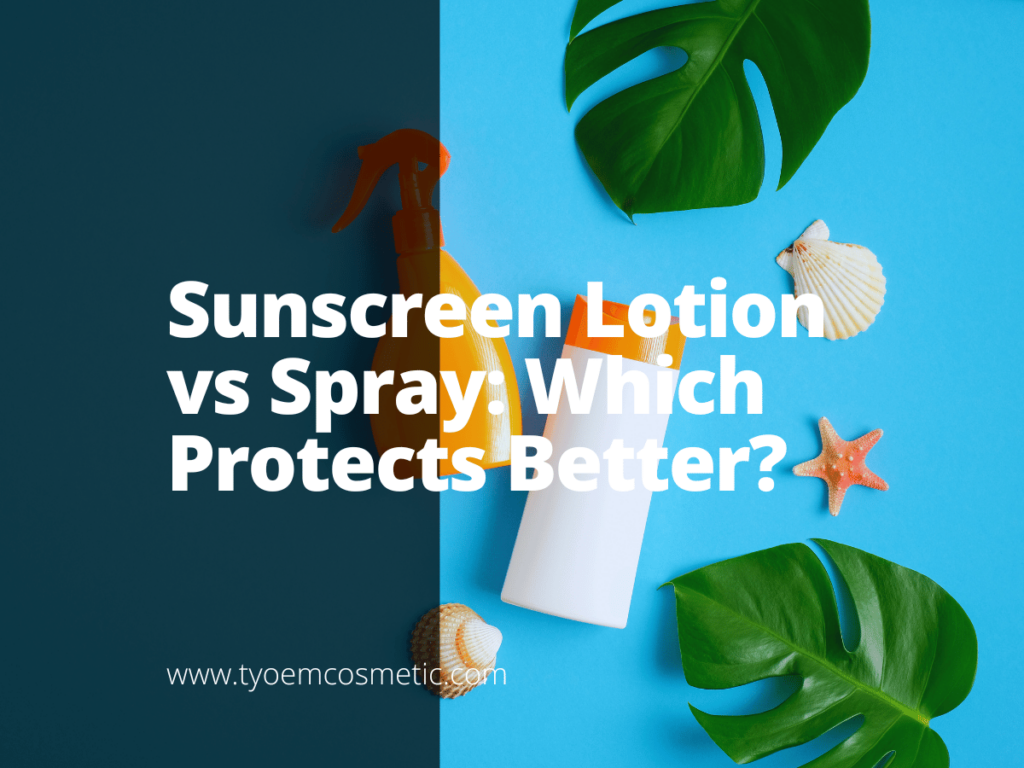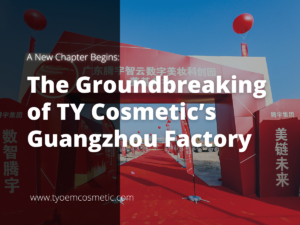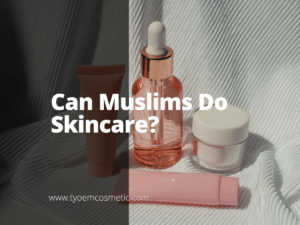Are your sunscreen offerings keeping pace with the latest in skin protection? Understanding the choice between sunscreen lotion and spray is essential for staying competitive in the skincare industry.
With expertise in skincare innovations, this guide breaks down the latest research and industry trends, providing a deep dive into the efficacy and practicality of both sunscreen formats.
Sunscreen lotions provide comprehensive coverage and moisturizing benefits, while sunscreen sprays offer convenient application and a lightweight feel.
In this guide, you’ll discover detailed information about each type, empowering you to make the best choices for your product lines and services.
Read on for valuable perspectives on sun protection options.
1. Overview of Sunscreen Importance
Sunscreen is more than a summer accessory; it’s a year-round shield against harmful UV rays. These rays can cause premature aging, sunburns, and increase the risk of skin cancer. Daily sunscreen use, regardless of the weather, is a critical step in maintaining healthy skin. It’s not just about preventing sunburn; sunscreen plays a vital role in preserving the skin’s overall health and appearance.
Moreover, sunscreen acts as a protective barrier, guarding against UVA rays. According to EHE Health, sunscreen needs to be maintained all year as up to 80% of the sun’s rays can penetrate clouds and even in snow reflecting similar amounts of UV rays, increasing sun damage risk. Thus, regular application of broad-spectrum sunscreen can significantly reduce harmful risks of UV rays.
2. Sunscreen Lotion: The Traditional Choice
Sunscreen lotions have been the go-to choice for years, known for their dual-purpose benefits of UV protection and moisturization. They provide thorough coverage and are ideal for meticulous skincare routines, ensuring complete protection. However, their thickness can lead to a heavy feel and potential challenges for those with oily or combination skin, especially those with darker complexions.
Composition and Application
- Base Ingredients: Sunscreen lotions typically incorporate a blend of moisturizers and UV-blocking compounds, ensuring skin hydration while providing sun protection.
- Active Ingredients: These lotions often contain zinc oxide or titanium dioxide, providing broad-spectrum protection against both UVA and UVB rays.
- Application Process: The lotion should be applied generously and evenly to all exposed areas of the skin, rubbing it in thoroughly to ensure complete coverage.
- Reapplication Needs: It’s recommended to reapply every two hours, especially after swimming or sweating, to maintain optimal sun protection.
Pros
- Visible Coverage: Ensures thorough application, reducing the risk of missed spots and uneven protection.
- Moisturizing Benefits: Often contains hydrating ingredients, beneficial for maintaining skin moisture while protecting from the sun.
- Wide SPF Range: Available in various SPF levels, catering to different sun exposure needs and skin types.
- Suitable for Sensitive Skin: Frequently offered in formulations gentle enough for sensitive skin, minimizing irritation.
Cons
- Time-Consuming Application: Requires more time and effort to apply evenly, which can be less convenient for quick use.
- Risk of Uneven Coverage: If not applied meticulously, can lead to uneven protection and exposed areas.
- Possible Residue: Can leave a white residue or a sticky feel on the skin, which might be uncomfortable or visible.
- Frequent Reapplication Needed: Needs to be reapplied regularly, especially after swimming or sweating, to maintain effectiveness.
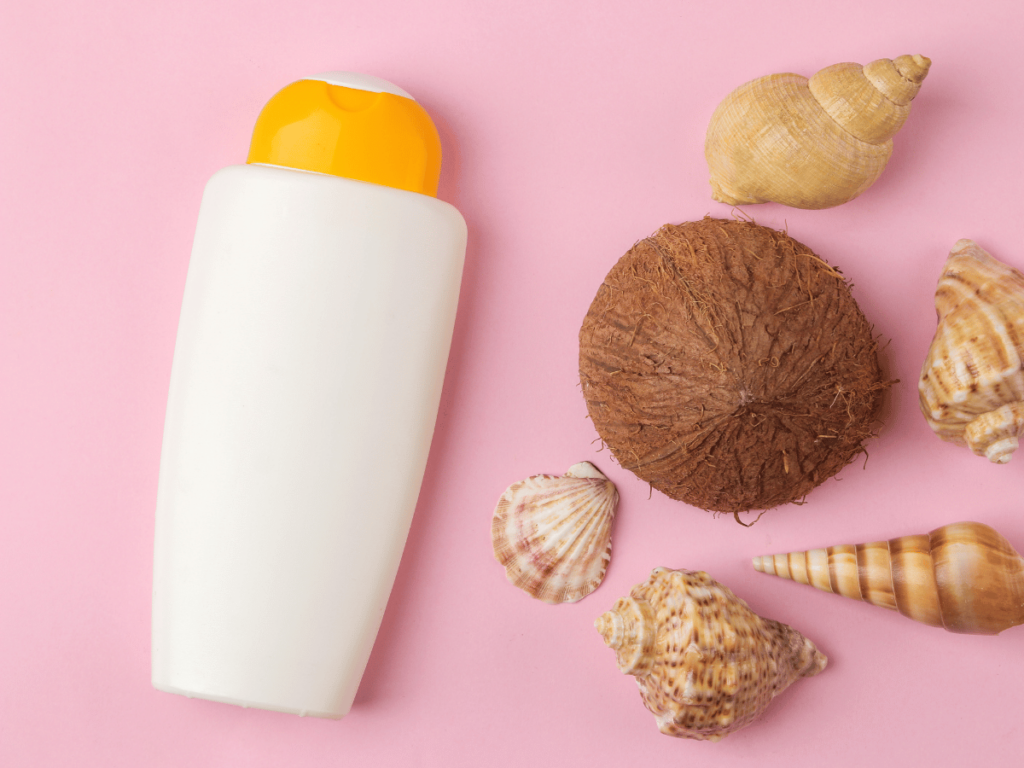
3. Sunscreen Spray: The Convenient Alternative
Sunscreen sprays are valued for their ease of use and quick application, making them perfect for active lifestyles and providing efficient coverage for large areas without the greasy residue common with lotions. Their fast-drying formula suits oily skin, allowing immediate sun exposure. However, careful application is crucial to avoid uneven coverage and inhalation risks, especially in less ventilated areas.
Composition and Application
- Base Ingredients: Spray sunscreens typically contain a blend of alcohol and lightweight silicones, providing a fast-drying and non-greasy feel on the skin.
- Active Ingredients: Sprays commonly contain avobenzone, oxybenzone, or octocrylene, which are chemical absorbers offering effective UV protection.
- Application Process: Sunscreen sprays are applied by holding the can a short distance from the skin and evenly spraying over all exposed areas in a smooth, sweeping motion.
- Reapplication Needs: Sprays should be reapplied every two hours and after swimming or sweating.
Pros
- Time-Efficiency: Spray sunscreens are quick to apply, ideal for busy lifestyles or on-the-go use.
- Lightweight Feel: They typically leave a less oily residue, appealing to those who dislike a heavy skin feel, as well as making them more comfortable to wear in hot conditions.
- Convenient Reapplication: Sprays are easy to reapply throughout the day, ensuring continuous protection.
- Portability: Their packaging is often more travel-friendly and less messy compared to lotion tubes or bottles.
Cons
- Risk of Inhalation: Sprays can lead to accidental inhalation of chemicals, potentially causing respiratory irritation or other health concerns.
- Coverage Uncertainty: It can be challenging to ensure complete coverage, leading to unprotected skin areas, increasing the risk of sunburn and skin damage.
- Environmental Concerns: Aerosol sprays may contain environmentally harmful propellants that contribute to environmental pollution and can be damaging to the ozone layer.
- Lower SPF Options: They are often available in lower SPF levels, which may not provide sufficient protection against intense sun exposure.
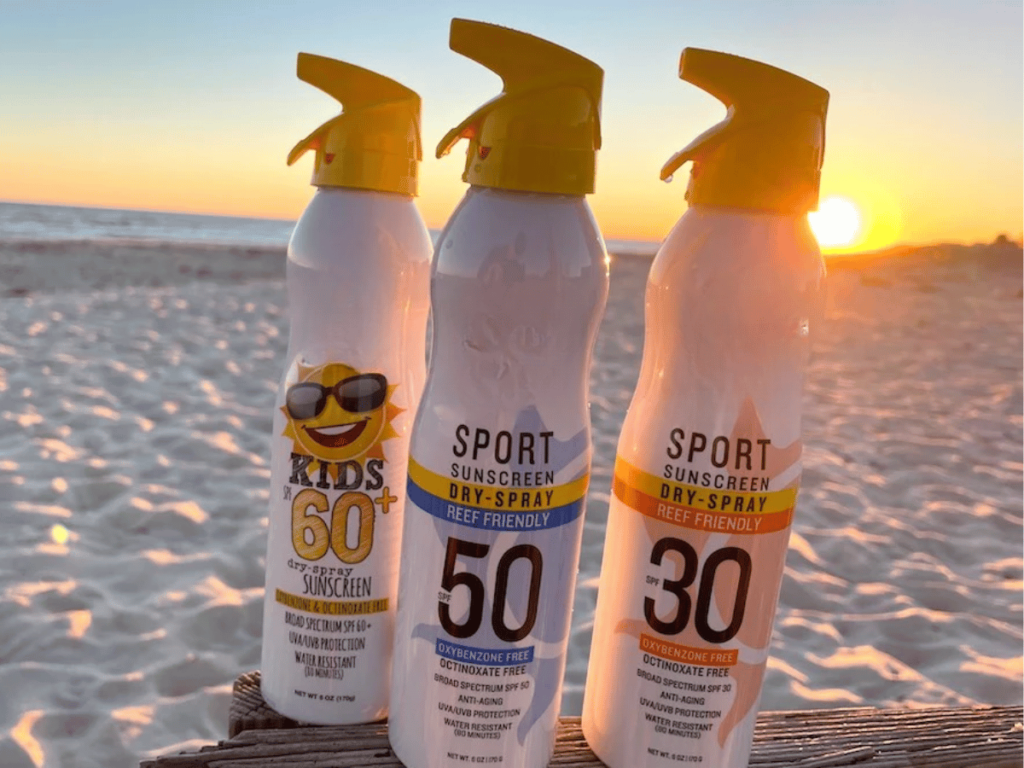
4. Comparing Sunscreen Lotion vs Spray
Choosing between sunscreen lotions and sprays is more than a matter of preference; it involves understanding their unique traits and functions in various settings. Here are the essential differences in sun protection choices:
Effectiveness in Sun Protection
- Lotion: Sunscreen lotions are renowned for their reliability in sun protection. Their thicker texture ensures a comprehensive layer over the skin, offering thorough coverage against UV rays. This makes lotions particularly suitable for extended outdoor activities where consistent protection is vital.
- Spray: While spray sunscreens are effective when applied correctly, their lighter application can sometimes lead to less coverage, particularly if not sprayed evenly. They are more convenient for quick applications and reapplications. However, sprays often require careful attention to avoid leaving unprotected areas.
Suitability for Different Skin Types
- Lotion: Lotions are often preferred for dry skin due to their moisturizing properties. They are less likely to cause irritation and can be beneficial for those with sensitive skin. Additionally, lotion formulas are diverse, offering options for various skin concerns, including acne-prone and aging skin.
- Spray: Spray sunscreens are typically favored by individuals with oily or combination skin. Their lightweight formula is less likely to leave a greasy residue or clog pores. However, sprays can sometimes include alcohol, which might not be suitable for those with sensitive or dry skin.
Ease of Application
- Lotion: Applying lotion sunscreen can be more time-consuming, requiring thorough rubbing into the skin. This can be advantageous as it allows for meticulous coverage, ensuring all exposed areas are protected. However, lotions can be challenging to apply evenly, especially in hard-to-reach areas like the back.
- Spray: Spray sunscreens stand out for their ease and speed of application. They are ideal for quickly covering large areas and are especially handy for those who need to apply sunscreen on the go. However, it can lead to uneven coverage if not applied properly, especially in windy conditions.
Here’s a table that outlines the advantages and potential drawbacks of spray sunscreens:
| Aspect | Description | Consideration |
| Ease of Application | Spray sunscreens are known for their quick and easy application. | Beneficial for rapid and hassle-free sunscreen application, particularly when covering large areas. |
| Ideal for On-the-Go | Convenient for those who need to apply sunscreen quickly, such as during outdoor activities or sports. | A practical choice for active lifestyles or when immediate application is needed. |
| Risk of Uneven Coverage | If not applied carefully, spray sunscreens can lead to patchy protection. | It’s important to ensure thorough and even application to maintain effective sun protection. |
| Application in Windy Conditions | Spray application can be challenging in windy environments. | Wind can disperse the sunscreen, leading to inadequate coverage and reduced effectiveness. |
Texture and Feel on Skin
- Lotion: Lotions generally have a richer texture, which can be more moisturizing and soothing, especially for dry skin types. They may leave a noticeable feel on the skin, which some find reassuring as a reminder of protection. However, this can sometimes feel heavy or greasy, particularly in hot and humid conditions.
- Spray: The appeal of spray sunscreens lies in their lightweight and often invisible finish on the skin. They are less likely to feel greasy or sticky, making them a favorite for those who prefer barely noticeable feel on their skin. This feature makes sprays popular for everyday use, especially for those with oily or combination skin.
Suitability for Different Activities and Settings
- Lotion: Sunscreen lotions are versatile and less likely to wash off in water and resist sweat better, making them suitable for various outdoor settings, especially in water sports or high-intensity activities. It also allows targeted application, which is beneficial for areas that require extra protection like the face or shoulders.
- Spray: Sprays are a popular choice for casual sun exposure settings, such as quick outdoor errands or short periods in the sun. They are less messy, making them a convenient option for reapplication. However, in windy outdoor environment or when sweating during vigorous activities, its effectiveness may be reduced.
5. 5 Tips for Choosing the Right Sunscreen
As per Fortune Business Insights, the sun care products market has witnessed significant growth in 2022 and is expected to continue increasing from 2023 to 2030. Here are essential tips to guide your decision-making:
#1 Broad-Spectrum Protection
When selecting sunscreen, prioritize broad-spectrum products. These offer comprehensive protection against both UVA and UVB rays, which are responsible for premature skin aging and burning, respectively. A broad-spectrum sunscreen ensures complete protection against all types of harmful sun radiation. TY Cosmetic’s range includes advanced broad-spectrum formulations, providing reliable and extensive protection.
#2 SPF Rating
Selecting the right SPF rating is crucial in ensuring adequate sun protection. An SPF of 30 or higher is recommended, as it blocks about 97% of UVB rays, reducing the risk of sunburn and skin damage that can lead to skin cancer. Remember, higher SPF numbers indicate more significant protection, but no sunscreen can block 100% of UVB rays. Making regular reapplication is essential for long-lasting protection.
#3 Water Resistance
For those who are frequently in water or sweat a lot, water-resistant sunscreen is essential. While no sunscreen is entirely waterproof, water-resistant formulas provide protection that lasts longer during swimming or excessive sweating. Always reapply after drying off or sweating, as this can reduce the effectiveness of sunscreen.
#4 Skin Compatibility
Choosing a sunscreen that suits the skin type is key to avoiding irritation and ensuring comfort. For example, for sensitive skin, look for products free from fragrances and parabens, and for acne-prone skin, non-comedogenic formulas are best as they won’t clog pores. Meanwhile, those with dry skin should opt for sunscreens with moisturizing ingredients.
#5 Environmental Considerations
Be environmentally conscious when selecting a sunscreen. For example, consider formulas that are reef-safe and free from oxybenzone and octinoxate, which are known to harm marine life. Choosing sunscreens with minimal environmental impact helps protect the ecosystems while safeguarding the skin. TY Cosmetic offers a range of eco-friendly options, aligning skincare with environmental practices.
Dive Deeper Into Our Resources
Interested in discovering more? Gain instant access to our diverse range of products:
Still haven’t found what you’re looking for? Don’t hesitate to contact us. We’re available around the clock to assist you.
Conclusion
This article has meticulously explored the differences between sunscreen lotion versus spray, offering a balanced perspective to aid in informed decision-making. Equipped with these insights, choosing the right sun protection becomes a clearer, more straightforward process for your sunscreen offerings.
If you are looking for premium sun protection solutions, TY Cosmetic offers a diverse selection tailored to meet various needs. Contact us today for further assistance and to explore our comprehensive product line.


